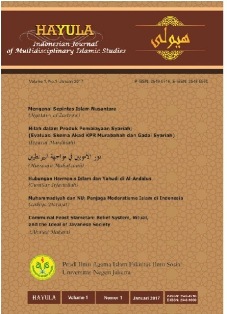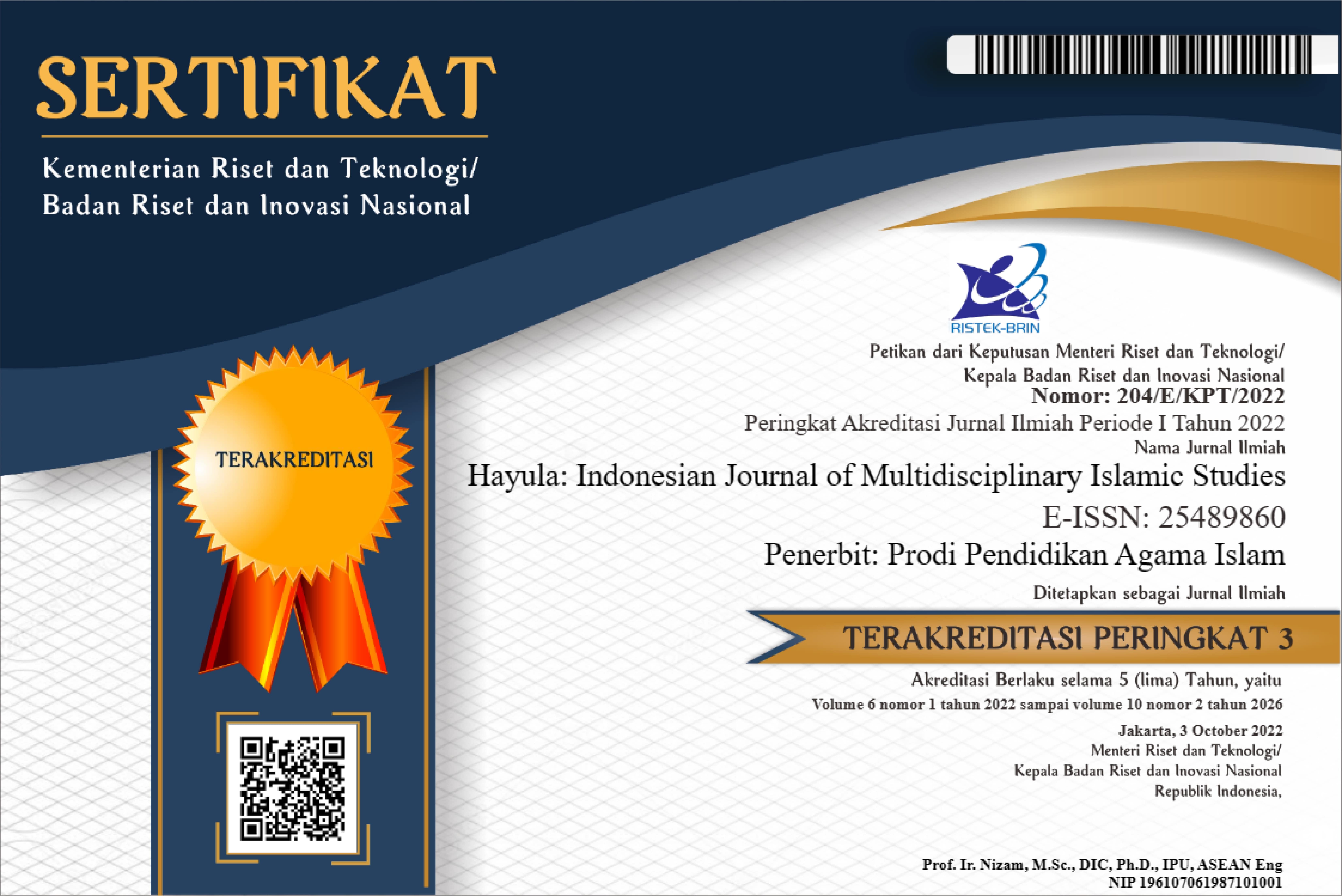Literacy Culture in the Islamic Religious Education and the Development of Islam in Indonesia
DOI:
https://doi.org/10.21009/004.2.02Keywords:
Islamic literacy culture, Islamic education, Jamaat Nur.Abstract
Globalization has enabled the development of Islam in one localized region with the help of global movements. What we do not much understand is how Turkish Ulama have contributed to develop Islamic literacy culture to enhance the development of Islam in Indonesia. This paper identified Jamaat Nur Movement who have utilized globalization to establish literacy culture among Indonesian Muslims and introduced the works of Bediuzzaman Said Nursi. Through careful study of this global movement, this study seeks to understand how a global Muslim organization took advantage from globalization and what are the local Muslims responses to it. This is a qualitative research with observation, interview, as well as library research as tools of data collection. The research keen to understand how globalization has become a tool for development of Islamic organization in Indonesia.
References
Azmil Tayeb. (2018). Islamic education in Indonesia and Malaysia: shaping minds, saving souls.
Banchoff, T. F. (2008). Religious Pluralism, Globalization, and World Politics. Oxford University Press.
Beyer, P. (2013). Religion in the Context of Globalization : Essays on Concept, Form, and Political Implication. Taylor and Francis.
Bryman, A. (2008). Social Research Methods (Issue Book, Whole). Oxford University Press.
Dijk, C. van, Kaptein, N. J. G., & Suharto. (2016). Islam, politics and change the Indonesian experience after the fall of Suharto.
Drakeley, S. (2005). The history of Indonesia. Greenwood Press.
Fogg, K. W. (Kevin). (2015). Hamka’s Doctoral Address at Al-Azhar: the Influence of Muhammad Abduh in Indonesia. Muhammadiyah University Yogyakarta.
Fox, J. J. (2004). Currents in Contemporary Islam in Indonesia.
Geri, M. (2019). Ethnic minorities in democratizing Muslim countries: Turkey and Indonesia. Palgrave Macmillan.
Giulianotti, R., & Robertson, R. (2007). Forms of Glocalization: Globalization and the Migration Strategies of Scottish Football Fans in North America. Sociology, 41(1), 133–152.
Hasan, N. (2009). Transnational Islam in Indonesia. In P. G. Mandaville (Ed.), Transnational Islam in South and Southeast Asia: Movements, Networks, and Conflict Dynamics. The National Bureau of Asian Research.
Kersten, C. (2018). A history of Islam in Indonesia.
Kosebalaban, H. (2011). Turkish foreign policy : Islam, nationalism, and globalization. Palgrave Macmillan.
Meuleman, J. (2005). Islam in the Era of Globalization : Muslim Attitudes towards Modernity and Identity.
Meuleman, J. H. (2002). Islam in the Era of Globalization Muslim Attitudes Towards Modernity and Identity. RoutledgeCurzon.
Mohammadi, A. (2002). Islam encountering globalization. RoutledgeCurzon.
OECD. (2018). PISA 2018.
Ozdalga, E. (1999). Naqshbandis in western and central Asia : change and continuity: papers read at a conference held at the Swedish Research Institute in Istanbul, June 9-11, 1997.
Parsons, D. (1997). The Music of Islam : recorded in Egypt, Morocco, Tunisia, Turkey, Yemen, Pakistan, Indonesia, Iran and Qatar. Celestial Harmonies.
Permana, F. E.. (2019, December 11). Kontak Ottoman Islam dan Nusantara, Ibnu Batutah: Hosmusam! Republika. https://www.republika.co.id/berita/dunia-islam/khazanah/19/12/11/q2bia1320-kontak-ottoman-islam-dan-nusantara-ibnu-batutah-hosmusam
Pringle, R. (2012). Understanding Islam in Indonesia : Politics and Diversity. Editions Didier Millet.
Robertson, R. (1995). Glocalization: Time-space and Homogeneity-heterogeneity. In M. Featherstone (Ed.), Global Modernities (pp. 25–44). Sage.
Roudometof, V. (2003). Glocalization, Space, and Modernity 1. The European Legacy: Toward New Paradigms, 8(1), 37–60.
Rudnyckyj, D. (2010). Spiritual economies : Islam, globalization, and the afterlife of development. Cornell University Press.
Rumadi, & Lunnon, R. (2015). Islamic post-traditionalism in Indonesia.
Saat, N. (2018). The state, ulama and Islam in Malaysia and Indonesia.
Saleh, F. (2001). Modern trends in Islamic theological discourse in 20th century Indonesia : a critical study. Brill.
Schneier, E. V. (2016). Muslim democracy : politics, religion and society in Indonesia, Turkey and the Islamic world. Routledge.
Setyaningrum, A. (2015). Pemikiran Pendidikan Asy-Syaukani dan Peranannya dalam Menciptakan Renaissance. Edukasia: Jurnal Penelitian Pendidikan Islam, 10.
Simandjuntak, D. (2018). No TitleIdentity politics looms over Indonesia’s presidential election. https://www.eastasiaforum.org/2018/11/10/identity-politics-looms-over-indonesias-presidential-election/
Turam, B. (2004). A bargain between the secular state and Turkish Islam: politics of ethnicity in Central Asia. NANA Nations and Nationalism, 10(3), 353–374.
Wahyudi, D. T. (2019, May 2). Toleransi Beragama Indonesia Menginspirasi Jerman. Indopos. https://indopos.co.id/read/2019/05/02/173913/toleransi-beragama-indonesia-menginspirasi-jerman/
Yavuz, M. H. (2003). Islamic Political Identity in Turkey. Oxford University Press.
Yilmaz, H. (2018). Comparison of the University Students in Turkey and Central Asia with Regards to Their Characteristics of Thinking, Decision Making and Cognitive Closure. Asian Journal of Education and Training, 4(4), 309–318.
Downloads
Published
How to Cite
Issue
Section
License
Authors who publish with this Journal agree to the following terms:
- Author retain copyright and grant the journal right of first publication with the work simultaneously licensed under a creative commons attribution licensethat allow others to share the work within an acknowledgement of the work’s authorship and initial publication of this journal.
- Authors are able to enter into separate, additional contractual arrangementfor the non-exclusive distribution of the journal’s published version of the work (e.g. acknowledgement of its initial publication in this journal).
- Authors are permitted and encouraged to post their work online(e.g. in institutional repositories or on their websites) prior to and during the submission process, as it can lead to productive exchanges, as well as earlier and greater citation of published works.
Users/public use of this website will be licensed to CC BY







